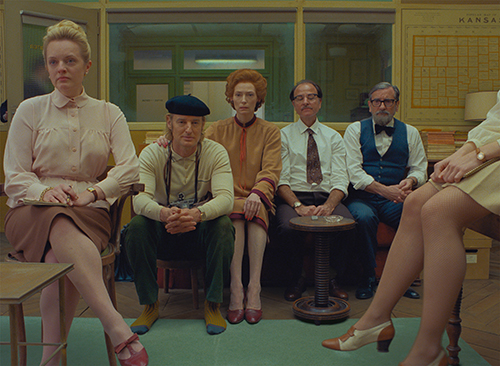
No one constructs films quite like director Wes Anderson. To experience his movies is to lose oneself in a bizarre yet beguiling blur of fantasy and reality, and his latest project The French Dispatch is very much of a piece with his previous outings.
The man behind The Royal Tenenbaums, The Grand Budapest Hotel and Isle of Dogs returns with a characteristically eccentric, all-star salute to the art of print journalism. Scroll down to find out everything you need to know, from the dazzling assortment of A-list faces to the fabulous craftspeople behind the camera.
What is the story of The French Dispatch?
The French Dispatch focuses on a group of ex-pat American journalists living in the fictional French town of Ennui-sur-Blasé. The collective has formed a travelogue periodical known as 'The French Dispatch', directed at the people of Kansas, USA, and presided over by editor Arthur Howitzer Jr.
Howitzer has assembled a crack team of writers to get beneath the skin of French provincial life, and he also tasks them with exposing the cultural and political shifts that are shaking the country to its core. In Anderson's words, the film is structured as "an obituary, a travel guide and three features", meaning that the bulk of the narrative is episodic in nature, focusing on individual journalistic assignments.
They are as follows. In 'The Concrete Masterpiece', J.K.L. Berensen takes a closer look at the art of the incarcerated Moses Rosenthaler, and the prison guard Simone who acts as his muse. Lucinda Krementz, meanwhile, is caught up in youthful activism in 'Revisions to a Manifesto', an assignment that brings her into contact with aspiring manifesto writer Zefferelli. And in 'The Private Dining Room of a Police Commissioner', the debonair Roebuck Wright (modelled on the writer James Baldwin) takes an intimate look at the art of so-called 'police cooking', only for his assignment to spiral into kidnapping and chaos.
Anderson says the movie is a tribute to the writers and editors of The New Yorker, adding: "The story is not easy to explain, [It's about an] American journalist based in France [who] creates his magazine. It is more a portrait of this man, of this journalist who fights to write what he wants to write. It's not a movie about freedom of the press, but when you talk about reporters you also talk about what's going on in the real world."
Who stars in The French Dispatch?
Anderson is famous for assembling dazzling, all-star ensemble casts for his movies, and The French Dispatch doesn't disappoint. The pivotal role of Arthur Howitzer Jr. is taken by Bill Murray, a member of the Anderson stock company since 1998's Rushmore. J.K.L. Berensen is played by Tilda Swinton, Lucinda Krementz by Frances McDormand, Zefferelli by Timotheé Chalamet, Moses Rosenthaler by Benicio del Toro, Simone by Lea Seydoux and Roebuck Wright by Jeffrey Wright.
And that cast description barely scratches the surface. Also present in the movie: Owen Wilson, Elisabeth Moss, Saoirse Ronan, Henry Winkler, Edward Norton, Matthieu Amalric, Stephen Park, Christoph Waltz, Willem Dafoe, Adrien Brody, Bob Balaban, Jason Schwartzman and Angelia Huston (who acts as our narrator).
It's a jaw-dropping line-up comprised of established Anderson favourites and Anderson debutantes. One can play spot the star on a scene-by-scene basis, although that would surely distract from the scrupulous and immaculate world that the director fashions in front of our very eyes.
There's also an appearance from British music legend Jarvis Cocker, whose associated music video 'Aline' can be watched below.
What identifies The French Dispatch as a Wes Anderson movie?
Wes Anderson is, by this stage in his career, a movie genre in his own right. Few contemporary directors boast such a distinct visual signature, one that communicates a unique air of artifice and wry, offbeat deadpan humour. A quintessential Anderson shot favours a theatrical ambience, almost akin to a doll's house, in which the camera movement and physicality of the actors is rigorously controlled and timed to memorable effect.
The camera is, more often than not, locked off and static, giving rise to imperceptible pans and occasional crash zooms. There will be an emphasis on changing aspect ratios, which again emphasises the general air of whimsy and theatricality. Lush pastel colours will give way to achingly nostalgic black and white sections. And the soundtrack will favour classic rock and jazz staples, again adding to the general air of timelessness.
All of this is borne out in the design of The French Dispatch. Anderson works with his regular collaborators, cinematographer Robert Yeoman, production designer Adam Stockhausen and costume designer Milena Canonero, each of whom claimed Oscars for The Grand Budapest Hotel. Here's a smattering of beautiful stills showcasing their work on The French Dispatch, which like all Anderson films occupies that divide between recognisable reality and seductive fantasy.
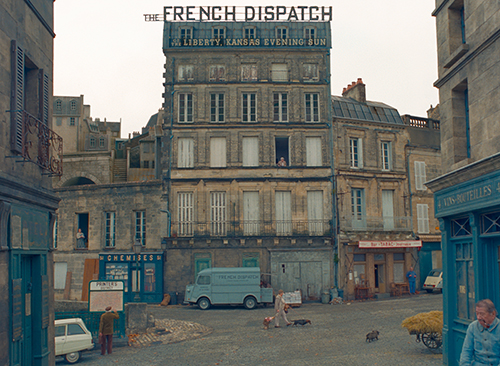
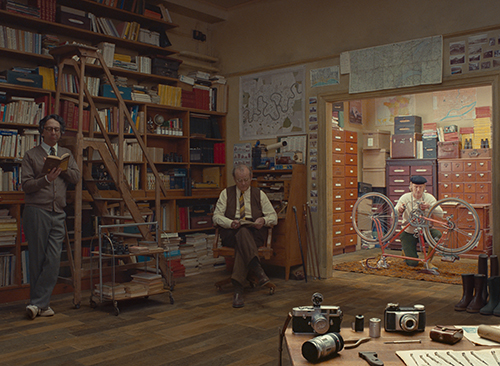
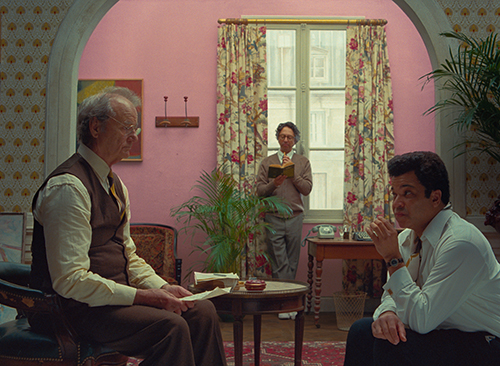
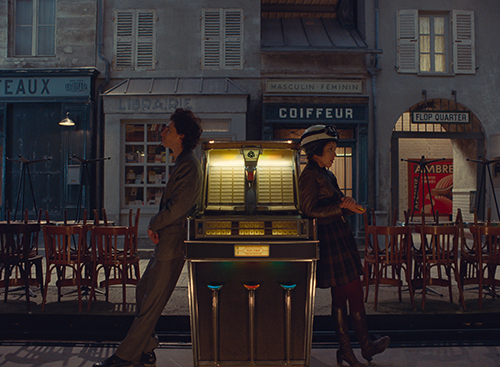
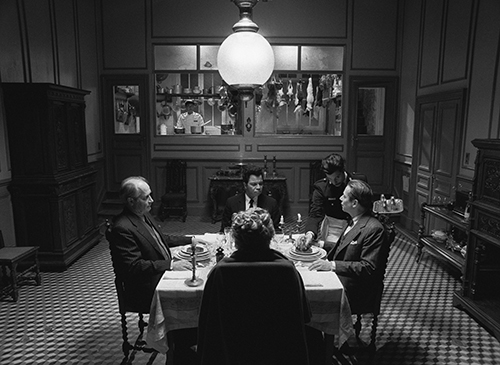
Who scores The French Dispatch?
The French Dispatch is the latest collaboration between Anderson and composer Alexandre Desplat, who started working with the filmmaker on 2009's Fantastic Mr. Fox. Desplat has located a unique and charming signature for his scores for Anderson movies, steadily introducing instrumental solos and layers of additional orchestration before the assembled harmonics come together in one vibrant whole. The end credits breakdown of 2012's Moonrise Kingdom outlines this, as a narrator identifies the leap between strings, piccolo, tubas and other elements.
Desplat won an Oscar for his featherlight and lovely score to The Grand Budapest Hotel, which favoured Eastern European instrumentation such as the balalaika and cimbalom. The Oscar win cemented the partnership between director and composer, and they're back together for The French Dispatch. Desplat is given an opportunity to musically salute the conventions of his home country, as the pre-released track 'Obituary' (heard in the trailer) demonstrates with its enchanting dance between clarinet, mandolin, piano (performed by the noted Jean-Yves Thibaudet), harpsichord, trumpet and violins.
Desplat's ability to musically distill both the strangeness and strange charm of Anderson's visual concoctions makes him a vital addition to the filmmaker's team.
How have the makers of The French Dispatch described the movie?
Check out the following video as Anderson and his cast and crew talk about the making of The French Dispatch.
What have the critics been saying about The French Dispatch?
The French Dispatch made its debut at the 2021 Cannes Film Festival where it was lauded by critics. Variety calls the film "dizzyingly intricate", describing it as "Anderson’s arms-wide-open tribute to a generation of complicated geniuses... the winks come as dense and dizzying as guilty-pleasure movie references do in a Quentin Tarantino picture".
"There is something delightfully perverse about Anderson's hyper-industrious treatment of such flimsy material," writes Nicholas Barber for the BBC. "His craftsmanship is so overwhelming that unless you're already allergic to his tics and trademarks, you should get a buzz from the film's many, many incidental pleasures. One thing's for sure: there is nothing quite like The French Dispatch – except Anderson's other films, of course."
"How does the New Yorker feel about the implication that it’s an offbeat thing of the past?" muses The Guardian's Peter Bradshaw. "I can’t imagine. But there is certainly much enjoyment to be found in Anderson’s amazing visuals, like those of his near-namesake, Roy Andersson. There are too many examples to pick out, but I loved the pinball machine, called “Modern Physics”, the cod French pop star called “Tip-Top” voiced by Jarvis Cocker, and the extraordinary split-screen “then and now” tableaux showing how parts of Ennui-Sur-Blasé have changed since the 19th century. The French Dispatch is very funny: I am grabbing it off the newsstand."
The Hollywood Reporter's David Rooney writes: "While The French Dispatch might seem like an anthology of vignettes without a strong overarching theme, every moment is graced by Anderson’s love for the written word and the oddball characters who dedicate their professional lives to it. There’s a wistful sense of time passing and a lovely ode to the pleasures of travel embedded in the material, along with an appreciation for the history of American foreign correspondents who bring their perceptive outsider gaze to other cultures."
When is The French Dispatch released in Cineworld cinemas?
The French Dispatch is released in Cineworld on 22nd October.


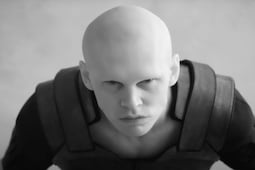

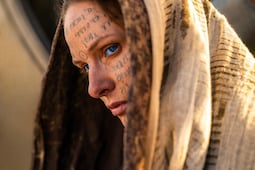
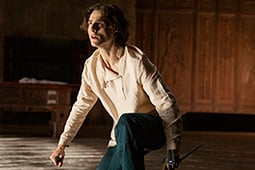
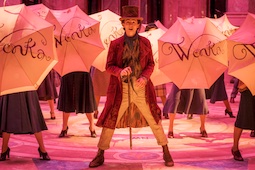
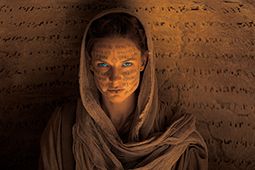
.jpg)


.jpg)
.png)



